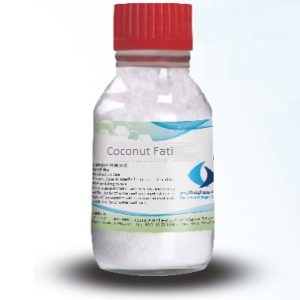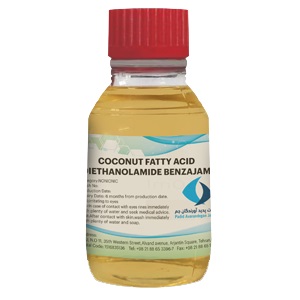Coconut fatty acid diethanolamide
Description
Another name for it is Cocamidopropyl Betaine, a viscous liquid used as a foaming agent.
Lauramide is a lightly yellowish viscous liquid that belongs to the group of non-ionic surfactants. This means that the water-repellent portion of this substance is electrically neutral at the common pH of cosmetic and hygiene products.
Lauramide is usually light-colored and thick at temperatures between 20 and 25 degrees Celsius.
Lauramide is used as a foaming agent, and its presence in dishwashing liquids, hand soaps, and shampoos is a measure of the high quality of these liquids.
This substance contributes to the stability of foam and softens the skin. Lauramide has moisturizing properties.
Lauramide/Cocamidopropyl is prepared in two ways:
From coconut oil
From methyl ester of coconut oil
Characteristics and applications of Lauramide:
It increases foam and reduces skin irritation, as well as making the hair manageable.
It provides viscosity in shampoos and is used in the production of hair and body shampoos, liquid soaps, and liquid soaps.
Cocamide DEA (Diethanolamide) and MEA (Monoethanolamide) – Cocamidopropyl Betaine (Lauramide) is widely used to thicken the liquid phase of cosmetic formulations, maintain ingredient mixtures, prevent the separation of different components of products, and enhance the cleansing properties of shampoo. These substances can be derived from coconut oil or synthesized artificially.
It’s worth noting that fatty acid diethanolamides, including coconut oil diethanolamine condensates, are extensively used in cosmetic products. It was reported in 1985 that diethanolamine condensates of coconut oil are present in nearly 600 cosmetic formulations, including bath oils, shampoos, conditioners, lipsticks, and hair dyes, with concentrations ranging from 1 to 25%. Non-cosmetic and hygiene applications of cocamide diethanolamide include use as a surfactant in soaps, light-duty detergents, and dishwashing detergents, as well as a material for cotton defoliation.
Coconut oil diethanolamine condensates are also used as corrosion inhibitors in water-based metalworking and metal finishing solutions. They are extensively employed as antistatic agents in plastics, for example, in polyethylene films for food packaging, and in rigid polyvinyl chloride. This substance, in combination with metallic salts, is also utilized as an antistatic agent for polystyrene and in impact-resistant styrene-butadiene rubber compounds.



